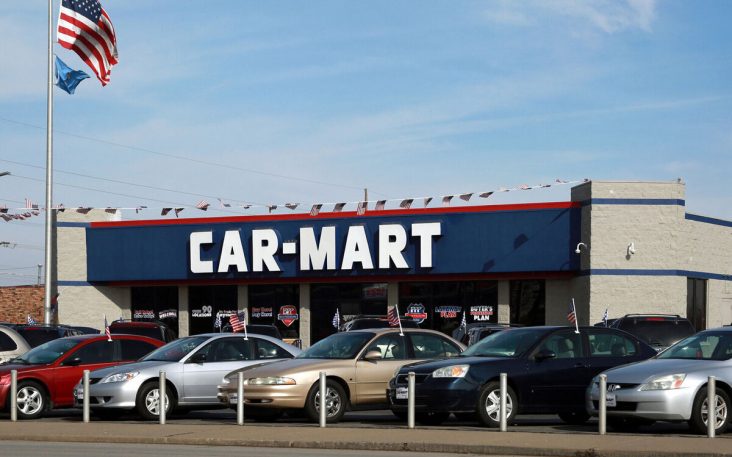Used vehicle prices to remain higher; has ‘offsetting impacts’ on Car-Mart, analysts say
by March 3, 2021 12:41 pm 1,941 views

Used vehicle prices are expected to remain higher and might continue to increase as more stimulus money is released and new vehicle production is limited, said Jeff Williams, president and CEO of America’s Car-Mart Inc. The higher prices may have “offsetting impacts” on the Rogers-based buy here, pay here used car dealer, analysts said.
In the third-quarter earnings call, Williams said with the recent microchip shortages, there’s a continuing shortage of good, affordable vehicles. In the third quarter, Car-Mart’s average vehicle sales price increased by 16.5% to $13,688, from $11,750 in the same period last year.
“We expect prices to stay up for the foreseeable future, although increases, like we’ve seen in the last 12 months, are not expected,” Williams said. “We do see and are seeing some leveling off of prices, but we do expect on a go-forward basis to see some increasing prices, especially if we roll in our new service contracts. There’s going to be a few percentage point increases in the sales prices just by us rolling out the new service contracts.”
As of mid-February, the Manheim Used Vehicle Value Index rose by 17.4% to 168.4, from the same month in 2020. Used vehicle prices rose 3.3% in the first half of February, from January. Prices were rising at an accelerating rate in the first two weeks of February, according to the index report. Vehicle prices are expected to continue to rise in the coming days and weeks. Prices usually rise each spring, but the increases typically start in March and coincide with income tax refunds.
Williams said the delays in the tax refunds this year will be more of a net negative against the stimulus payments in January. But in the coming months, more stimulus money and income tax refunds are expected. Williams expects sales volumes to be strong, and vehicle inventories are good leading into the fourth quarter. Car-Mart’s fourth quarter of fiscal 2021 ends April 30.
Through three quarters, the company’s earnings have risen by 44.1% to $60.61 million, from $42.05 million in the same period in the previous fiscal year. Revenue has increased by 16.5% to $639.53 million, from $548.92 million. On Feb. 24, shares of Car-Mart (NASDAQ: CRMT) were trading at a high of $143.20. On Wednesday (March 3), the stock was trading at $138.75, up 96 cents, or 0.7%. In the past 52 weeks, the stock has ranged between $143.20 and $35.18.
In a third-quarter earnings report, equity analysts Kyle Joseph, John Hecht, Ryan Carr and equity associate Lance Jessurun, all of Jefferies, noted Car-Mart’s transition from a collections company to more of a sales company that’s good at collections. This is expected to lead to greater investments in procurement and sales and marketing and result in more customers, the analysts said. The average dealership serves about 570 customers, but Car-Mart believes each can grow to serve 1,000 customers. In the third quarter, active loans increased by 6.9% to 85,807, from 80,250 in the same period last year. In December, Car-Mart opened its 151st dealership in Edmond, Okla. It was the third dealership to open in fiscal 2021.
Car-Mart’s vehicle sales rose 5.6% to 14,053 in the third quarter, from the same period last year. The company’s contract term continues to rise along with used car prices. The average term has risen to 35 months, from 30.8 months in the same period last year.
“We believe (Car-Mart) is well-positioned from a competitive perspective as indirect lenders have tightened and as ‘mom-and-pop’ competitors face similar inventory sourcing issues/higher used car prices,” the analysts said. Mixed short-term effects on Car-Mart include elevated used car prices, “which have offsetting impacts on the business, and a tighter credit environment which should support sales.”
Auto loan performance declined in January but improved from last year and was much better than what it would be in a typical recession, according to the Manheim report. Loan delinquencies and defaults have been low because of stimulus money and loan accommodations. In January, 1.4% of auto loans were severely delinquent and were marginally up from December 2020. Sixty-day delinquencies have risen over the past six months but were down 12% from January 2020. The better-than-normal loan performance and strong vehicle values have helped auto credit access to rise in recent months, the report shows. In Car-Mart’s third quarter, net charge-offs declined to 4.9%, from 5.9% in the same period last year. Accounts over 30 days past due fell to 2.8%, from 3.6%.
Manheim’s Dealertrack Auto Credit Index showed loosening credit in the last four months of 2020, but credit tightened in January and remains tighter than a year ago.
The Index of Consumer Sentiment from the University of Michigan fell by 24% to 76.8 in February, from 101 in the same month last year. The index fell 2.8%, from 79 in January. The indexes on existing economic conditions and future expectations also fell. Buying conditions for vehicles declined to the lowest level since 2008, the report shows. Buying conditions for houses also fell.
